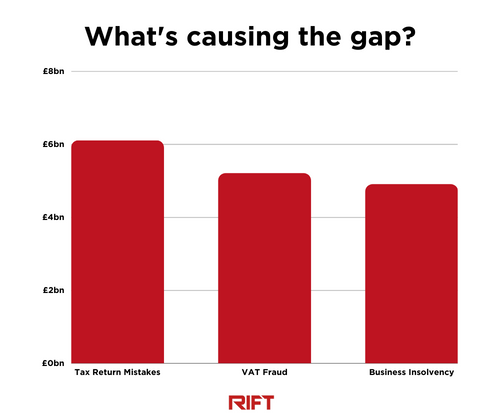Cost of living crisis likely to widen the £32.1 billion tax gap
Tuesday 9th January 2023
Tuesday 9th January 2023
We can reveal that despite HMRC seeing a -6.7% annual reduction, the gap between tax owed and tax paid still currently sits at £32.1bn and this gap is expected to widen as the nation struggles to combat the cost of living crisis.
The latest figures show that in a single financial year, HMRC sees a shortfall of £32.1bn in the sum of the tax they receive versus what they expect to be paid.


The biggest contributing factor? Taxpayers who simply fail to take reasonable care when recording their transactions or preparing their tax returns, with the tax gap sitting at a huge £6.1bn as a result of their negligence.
Criminal attacks on the tax system, such as smuggling or VAT fraud, accounts for the second largest tax gap at £5.2bn. Non-payment, driven largely by business insolvency, ranks as the third largest tax gap at £4.9bn.
The silver lining for HMRC is that the tax gap has reduced on an annual basis, down -6.7%, with just criminal attacks and non-payments the only two tax gap categories to see an increase at 6.1% and 6.5% respectively.
Both tax errors and avoidance also ranked as the smallest tax gaps at £3bn and £1.2bn, while the gap caused by legal misinterpretations has seen the largest annual decline at -33.9%.
CEO of RIFT Tax Refunds, Bradley Post, Commented:
Despite a problematic period defined by the pandemic, the total tax gap during the 2020/21 financial year has actually declined on an annual basis.
This is certainly a positive given the financial hardship many faced as a result of Covid restrictions, although it’s clear that the pandemic did leave its mark in this respect. Non-payments, which are largely driven by business insolvencies, was one of just two areas to see an increase, whilst it also accounted for the third largest gap.
As is often the case in times of uncertainty, criminal activity accounted for the second largest proportion of the nation’s tax gap and was the only other area to see an increase.
While the tax gap has reduced, it’s likely that this reduction will be short lived. The expectation is that it could widen quite considerably once the dust settles on the 2021/22 financial year, as many households and businesses have been stretched to breaking point as a result of the cost of living crisis.
Of course you do! Get a grip on your cash with our free money saving tips, guides and videos sent straight to your inbox. What have you got to lose?
RIFTPROD2 - Subscriber
}